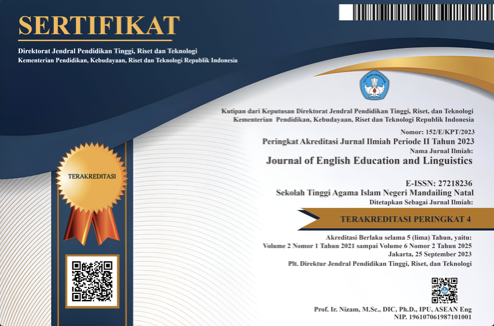GRAMMATICAL ERRORS IN INDONESIAN-ACEHNESE EFL LEARNERS’ DESCRIPTIVE ESSAYS
DOI:
https://doi.org/10.56874/jeel.v1i2.242Keywords:
grammatical errors, error classification, sources of errors, intralingual errors, developmental errorsAbstract
This study was carried out to analyze the types and the sources of grammatical errors encountered in Acehnese EFL learners’ essays. It focused on finding out the most dominant type of errors and the most plausible explanation for the source of errors the students made in their writing. Twenty (20) learner’s essays were collected to be analyzed by referring to Azar’s error classification as well as Richard’s theory on learners’ sources of the errors. The results showed that the most frequent type of errors in the learners’ essays were incomplete sentences and verb tenses, making up more than a third (36.7%) of the total 392 errors. The findings also showed intralingual errors are the major causes of the learners’ grammatical errors, followed by interference errors and developmental errors respectively. The findings suggest that in teaching essay writing, teachers of Indonesian-Acehnese EFL learners need to adopt and devise more appropriate techniques in both grammar and writing instructions, focusing on complete sentence structure and tenses in order to minimize the possible errors made by the learners in their writing.
References
Abbasi, M., & Karimnia, A. (2011). An analysis of grammatical errors among Iranian Translation students: Insights from interlanguage theory. European Journal of Social Sciences, 25(4), 525–536. https://doi.org/10.24093/awej/vol10no2.16
Amara, N. (2018). Correcting students’ errors: Theory and Practice. Current Educational Research, 1(5), 45–57.
Azar, B. S. (2009). Understanding and Using English Grammar (4th ed.). Pearson Education.
Brown, H. D. (2014). Principles of Language Learning and Teaching (6th ed.). Pearson Education.
Burns, A. (1999). Collaborative Action Research for English Teachers. Cambridge University Press.
Dulay, H., Burt, M., & Krashen, S. (1982). Language Two. Oxford University Press.
Etfita, F. (2019). Correlation between students’ grammar mastery and news writing ability. AL-ISHLAH: Jurnal Pendidikan, 11(1), 70. https://doi.org/10.35445/alishlah.v11i1.113
Fauziati, E. (2011). Interlanguage and error fossilization: A study of Indonesian students learning English as a foreign language. CONAPLIN JOURNAL: Indonesian Journal of Applied Linguistics, I(1), 25–40.
Floranti, A. D., & Adiantika, H. N. (2019). Grammatical error performances in Indonesia EFL learners’ writing. IJELTAL (Indonesian Journal of English Language Teaching and Applied Linguistics), 3(2), 277–295. www.ijeltal.org
Garrido, C. G., & Romero, C. R. (2012). Errors in the use of English tenses. Íkala, 17(3), 286–296.
Harmer, J. (2015). The Practice of English Language Teaching (5th ed.). Pearson Education Limited.
Heydari, P., & Bagheri, M. S. (2012). Error analysis: Sources of L2 learners’ errors. Theory and Practice in Language Studies, 2(8), 1583–1589. https://doi.org/10.4304/tpls.2.8.1583-1589
Huda, T., & Wuda, R. W. (2019). Grammatical errors analysis on EFL learners writing: A case study at junior high Islamic boarding school in Jember. Journey (Journal of English Language and Pedagogy), 2(2), 113–117. https://doi.org/10.33503/journey.v2i2.549
Irawansyah, I. (2017). Why study error? IJEE (Indonesian Journal of English Education), 4(2), 120–129. https://doi.org/10.15408/ijee.v4i2.5972
Istiqomah, S., Raja, P., & Kadaryanto, B. (2014). Correlation Between Grammar Mastery And Descriptive Writing Ability. UNILA Journal of English Teaching, 3(4).
James, C. (1998). Errors in Language Learning and Use: Exploring Error Analysis. Routledge.
Javed, M., Juan, W. X., & Saima, N. (2013). A study of students’ assessment in writing skills of the English language. International Journal of Instruction, 6(2), 129–144.
Khatter, S. (2019). An analysis of the most common essay writing errors among EFL Saudi female learners (Majmaah University). Arab World English Journal, 10(3), 364–381. https://doi.org/10.24093/awej/vol10no3.26
Kurniawan, D. (2017). The correlation between students’ grammar mastery and writing skill. E-Journal of ELTS (English Language Teaching Society), 5(4), 1–14.
Muhyidin, A. (2020). Does the writing exposition text ability correlate to reading habit and discourse markers mastery? Journal for the Education of Gifted Young Scientists, 8(2), 885–895. https://doi.org/10.17478/JEGYS.682065
Murtiana, R. (2019). An analysis of interlingual and intralingual errors in EFL learners’ composition. Journal Educative : Journal of Educational Studies, 4(2), 216. https://doi.org/10.30983/educative.v4i2.2544
Nassaji, H. (2015). Qualitative and descriptive research: Data type versus data analysis. Language Teaching Research, 19(2), 129–132. https://doi.org/10.1177/1362168815572747
Nima, L. (2019). Tenses with ESL writing tenses : A case study of Bhutanese secondary students. International Journal of Humanities and Social Science, 1(1), 1–9.
Phetdannuea, F., & Ngonkum, S. (2016). An analysis of interlingual errors and intralingual errors in Thai EFL students’ writing at Khon Kaen University. KKU Research Journal (Graduate Studies) Humanities and Social Sciences, 4(2), 35–51.
Qonitatun, Q. (2016). The quality of essay writing of Indonesian EFL learners. ASIAN TEFL Journal of Language Teaching and Applied Linguistics, 1(1), 55–76. https://doi.org/10.21462/asiantefl.v1i1.6
Rahman, M. S., & Ali, M. M. (2015). Problems in mastering English tense and aspect and the role of the practitioners. Journal Of Humanities And Social Science, 20(4), 131– 135.
Richards, J. C. (1975). Error Analysis: Perspectives on Second Language Acquisition. Routledge.
Salima, R. (2012). Measures of eliminating EFL students’ errors in writing. Procedia - Social and Behavioral Sciences, 69, 318–327. https://doi.org/10.1016/j.sbspro.2012.11.416
Santosa, M. H. (2017). Learning approaches of Indonesian EFL Gen Z students in a Flipped Learning context. Journal on English as a Foreign Language, 7(2), 208. https://doi.org/10.23971/jefl.v7i2.689
Sari, E. M. P. (2016). Interlingual errors and intralingual errors found in narrative text written by EFL students in Lampung. Jurnal Penelitian Humaniora, 17(2), 95. https://doi.org/10.23917/humaniora.v17i2.2501
Seitova, M. (2016). Error analysis of written production: The case of 6th grade students of Kazakhstani school. Procedia - Social and Behavioral Sciences, 232, 287–293. https://doi.org/10.1016/j.sbspro.2016.10.022
Sermsook, K., Liamnimitr, J., & Pochakorn, R. (2017). An analysis of errors in written english sentences: A case study of Thai EFL students. English Language Teaching, 10(3). https://doi.org/10.5539/elt.v10n3p101
Sijono, S., & Aristo, T. J. V. (2019). An analysis of students’ erroneous sentence found in descriptive text written by students in Sintang. VELES Voices of English Language Education Society, 3(2), 118–126. http://e- journal.hamzanwadi.ac.id/index.php/veles/article/view/1560
Singh, C. K. S., Jageer Singh, A. K., Abd Razak, N. Q., & Ravinthar, T. (2017). Grammar errors made by ESL tertiary students in writing. English Language Teaching, 10(5), 27. https://doi.org/10.5539/elt.v10n5p16
Sorg, R. K. (2014). Identifying Errors in ESL Writing [University of Toledo]. http://rave.ohiolink.edu/etdc/view?acc_num=toledo1418231647
Sukasame, N., Kantho, S., & Narrot, P. (2014). A study of errors in learning English grammatical structures on tenses of MatthayomSuksa 4 students of the Demonstration School, KhonKaen University. Procedia - Social and Behavioral Sciences, 116, 1934–1939. https://doi.org/10.1016/j.sbspro.2014.01.498
Wilcox, K. C., Yagelski, R., & Yu, F. (2014). The nature of error in adolescent student writing. Reading and Writing, 27(6), 1073–1094. https://doi.org/10.1007/s11145- 013-9492-x
Zulfikar, Z., & Aulia, C. T. (2020). Exploring Acehnese EFL college students’ perceptions on collaborative writing. Wanastra : Jurnal Bahasa Dan Sastra, 12(2), 171–180. https://doi.org/https://doi.org/10.31294/w.v12i1
Downloads
Published
Issue
Section
License
All articles published in the Journal of English Education and Linguistics are licensed under a Creative Commons Attribution-ShareAlike 4.0 International (CC BY-SA) license. This means anyone is free to copy, transform, or redistribute articles for any lawful purpose in any medium, provided they give appropriate attribution to the original author(s) and Journal of English Education and Linguistics, link to the license, indicate if changes were made, and redistribute any derivative work under the same license.
Copyright on articles is retained by the respective author(s) without restrictions. A non-exclusive license is granted to the Journal of English Education and Linguistics to publish the article and identify itself as its original publisher, along with the commercial right to include the article in a hardcopy issue for sale to libraries and individuals.
Although the conditions of the Creative Commons Attribution-ShareAlike 4.0 International (CC BY-SA) license do not apply to authors (as the copyright holder of your article, you have no restrictions on your rights), by submitting to the Journal of English Education and Linguistics, authors recognize the rights of readers and must grant any third party the right to use their articles to the extent provided by the license.

This work is licensed under a Creative Commons Attribution-ShareAlike 4.0 International License.








